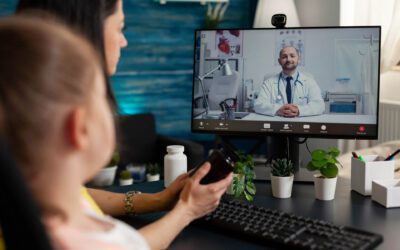With social media being as influential as it is, it’s easy to hear about all the different ways a speech language pathologist can help your child say more, and talk clearer.
A big one that has been mentioned in speech therapy videos a lot recently on platforms like TikTok and Instagram is, PROMPT therapy.
So in this article we want to answer some common questions we get asked about PROMPT therapy.
What is PROMPT therapy?
PROMPT therapy is a tactile-kinesthetic (touch and feel) approach used with children who have delays in speech.
PROMPT stands for Prompts for Restructuring Oral Muscular Phonetic Target.
The technique is used by the clinician placing hands on the lips, jaw, nose, and chin, and under chin (to stimulate tongue movement) of your child to help the child understand placement for their articulators (pieces of the mouth that form our sounds) for accurate productions.
What does PROMPT therapy look like in sessions?
You might see your speech therapist wearing gloves or sanitizing their hands before a session, because much of PROMPT therapy involves the clinician touching and being hands on in and around the mouth area of your child. They might place their hands in various areas of the oral region while your child simultaneously talks. Over time, your child will start to associate these sounds with the tactile (touching) cues, resulting in significant improvements in their overall articulation skills.
How is PROMPT used during a session?
PROMPT is used throughout sessions to encourage functional language building.
It is not a technique used during more drill style articulation therapy, but rather is used throughout the session to give the child additional input on how to say the words better so that your child can be understood.
Can my child receive PROMPT as a part of their therapy?
Yes, absolutely! Use of PROMPT therapy in speech sessions are determined upon evaluation. If your child is eligible to receive PROMPT, your SLP can determine this in the first few sessions. Typically, PROMPT therapy is used with children who have Childhood Apraxia of Speech or severe articulation delays, however PROMPT can be beneficial for any child who needs to improve the clarity of their speech. PROMPT can result in significant improvements if your child’s speech is very unintelligible/unclear, or if the patterns in his/her speech errors are not clear.
Do therapists need special training for PROMPT therapy?
Yes there are four different levels of training available for Speech-Language Pathologists (SLPs).
- PROMPT Trained
- Bridging Trained
- PROMPT Certified
- PROMPT Instructor
Can I, as the caregiver, receive PROMPT training?
No, PROMPT is not an available training for parents. It is a specialized speech therapy training available to SLP’s only. Only a licensed SLP can administer PROMPT therapy, however, parents are always encouraged to participate in the speech therapy sessions, learn about PROMPT therapy, and get trained in PROMPT to carryover these strategies at home.
Our PROMPT Trained Speech Therapists at Always Keep Progressing are here to help you determine what style of treatment is best for your child. Through an evaluation, we can assess your child’s current understanding and use of language and their intelligibility (how much people understand what they are saying). If you have any questions or concerns about your child’s language or articulation skills, call our office to schedule an appointment with a trained Speech Therapist.
Other Resources
For more information on PROMPT therapy and how it works, there are some great resources, articles, and videos you can see to learn here:
Children’s Minnesota – Article on PROMPT




0 Comments